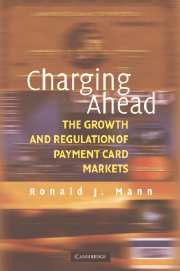Book contents
- Frontmatter
- Contents
- Figures and Tables
- Acknowledgments
- Introduction
- PART I THE BASICS OF PAYMENT CARDS
- PART II EASY MONEY
- 3 In Defense of Credit Cards
- 4 The Psychology of Card Payments: Card Spending and Consumer Debt
- 5 Over the Brink: Credit Card Debt and Bankruptcy
- PART III THE PUZZLE OF PAYMENT CARDS
- PART IV REFORMING PAYMENT SYSTEMS
- PART V OPTIMIZING CONSUMER CREDIT MARKETS AND BANKRUPTCY POLICY
- Conclusion
- Appendix: Country-Level Data
- Notes
- Bibliography
- Index
5 - Over the Brink: Credit Card Debt and Bankruptcy
Published online by Cambridge University Press: 06 July 2010
- Frontmatter
- Contents
- Figures and Tables
- Acknowledgments
- Introduction
- PART I THE BASICS OF PAYMENT CARDS
- PART II EASY MONEY
- 3 In Defense of Credit Cards
- 4 The Psychology of Card Payments: Card Spending and Consumer Debt
- 5 Over the Brink: Credit Card Debt and Bankruptcy
- PART III THE PUZZLE OF PAYMENT CARDS
- PART IV REFORMING PAYMENT SYSTEMS
- PART V OPTIMIZING CONSUMER CREDIT MARKETS AND BANKRUPTCY POLICY
- Conclusion
- Appendix: Country-Level Data
- Notes
- Bibliography
- Index
Summary
The relationships between credit card debt and spending, on the one hand, and consumer debt, on the other, show two things of policy import. First, credit card debt does not merely substitute for other types of consumer debt. Second, increased levels of consumer debt are financing discretionary consumption (represented by credit card spending). A substantial share of each credit card dollar spent is borrowed. Yet those relationships do not show that using credit cards increases the risk of financial distress. Thus, a more pointed question is whether the data support the perception that credit card borrowing leads to bankruptcy. This chapter explores that question.
Data Problems
It is difficult to obtain data that capture the possibility that credit cards foster a prodigal impulse that leads to financial distress. For example, data about delinquency rates on credit card accounts are readily available, and those data show that delinquency rates correlate with consumer bankruptcy filings. That relation, however, is not surprising. Delinquency rates on automobile loans and home mortgages are also likely to correlate with consumer bankruptcy filings.
Moreover, the causal link evidenced by the delinquency data is not at all clear. It is, for example, at least as likely that the same economic conditions that lead to consumer bankruptcies also lead to credit card delinquencies as it is that delinquencies on credit cards cause consumer bankruptcies.
- Type
- Chapter
- Information
- Charging AheadThe Growth and Regulation of Payment Card Markets around the World, pp. 60 - 72Publisher: Cambridge University PressPrint publication year: 2006

